Outside/Inbox: Do Bears Hoot?
We’ve got answers to your burning questions: a query about the impacts of wildlife smoke on bird migration; a long-smoldering family debate over whether or not bears can hoot; and, perhaps, stamping out the fire in the gas furnace heating your home.
Question 1: What home heating system is best for the climate?
Question 2: Is wildfire smoke impacting bird migration?
Question 3: Do bears hoot?
Question 4: Are farmers practicing agroforestry in New England?
Featuring: Nate (The House Whisperer) Adams, Emily Mottram, Joe Lajewski, Olivia Sanderfoot, Anni Yang, Dave Mance III, Andy Timmins, David Telesco, Kate Macfarland, and Meghan Giroux.
If you’ve got a question for the Outside/In[box] hotline, give us a call! We’re always looking for rabbit holes to dive down into. Leave us a voicemail at: 1-844-GO-OTTER (844-466-8837). Don’t forget to leave a number so we can call you back.
Love Outside/In? You’ll love the Outside/In newsletter! Sign-up here.
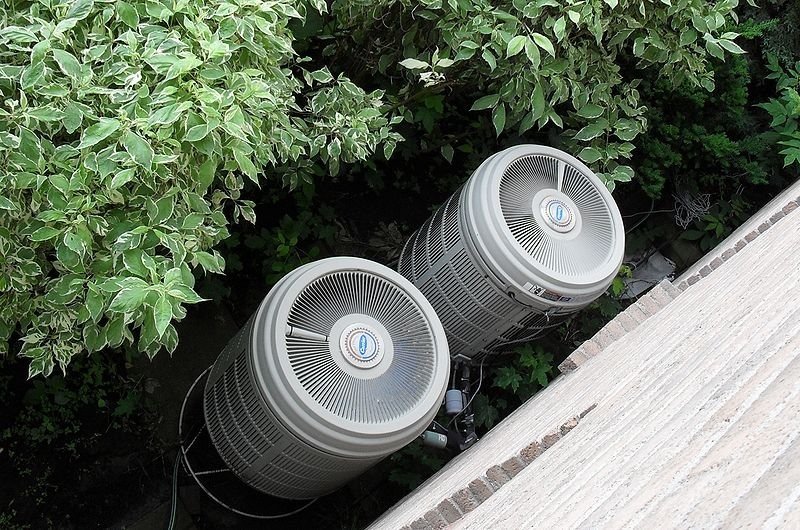
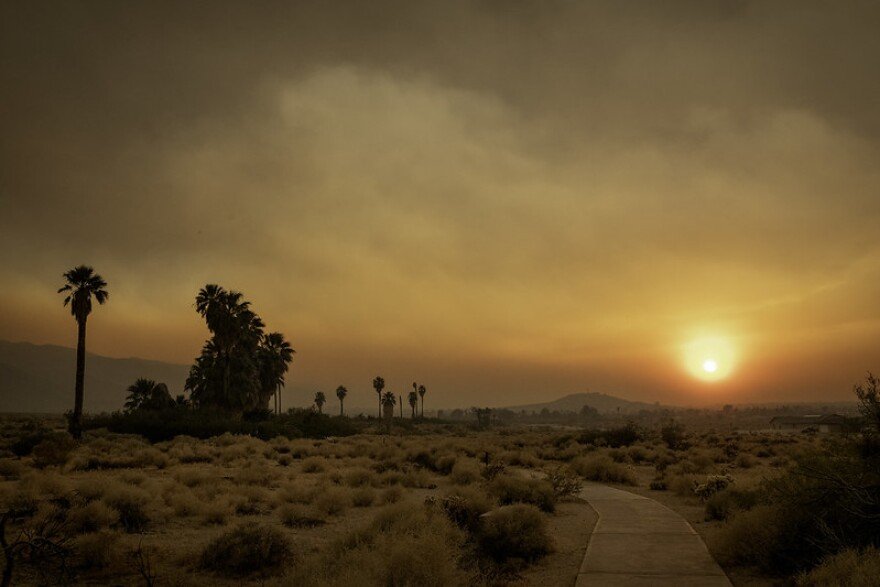
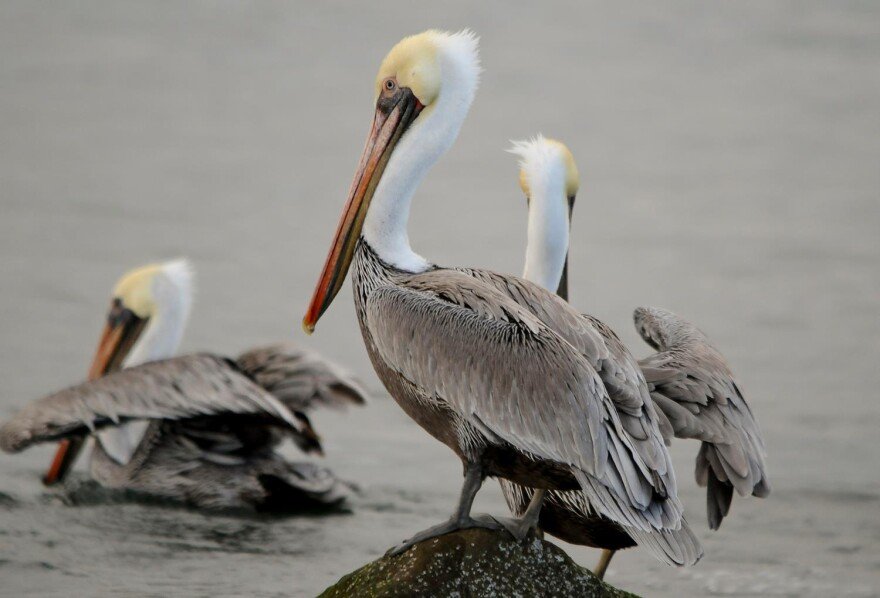


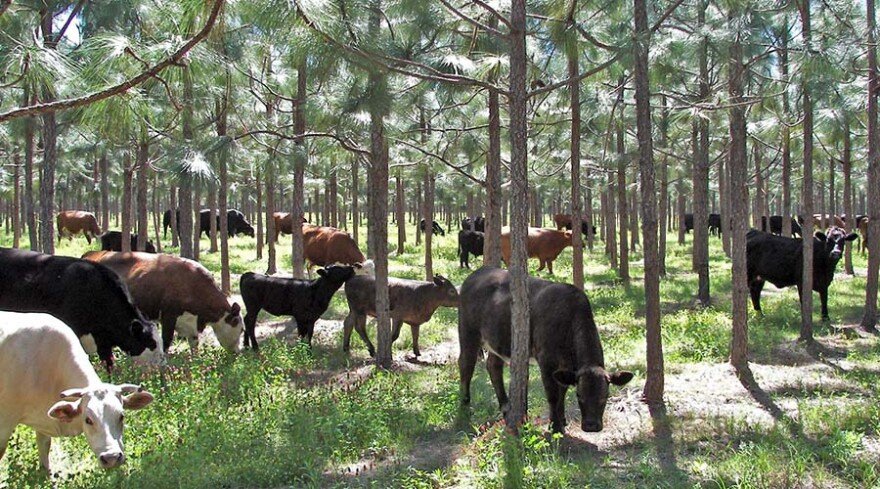
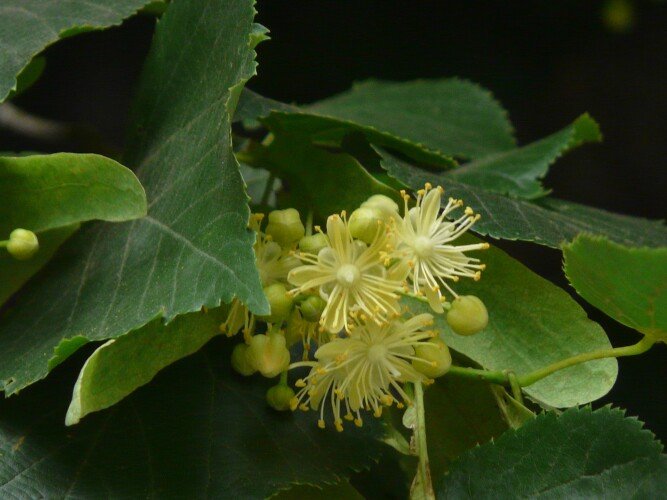
Credits
Reported and produced by Felix Poon, Taylor Quimby, Jessica Hunt, and Justine Paradis
Host: Justine Paradis
Edited by Taylor Quimby
Additional editing by Cori Princell
Executive producer: Rebecca Lavoie
Mixed by Felix Poon, Taylor Quimby, Jessica Hunt, and Justine Paradis
Theme: Breakmaster Cylinder
Additional music by Blue Dot Sessions
Audio Transcript
Note: Episodes of Outside/In are made as pieces of audio, and some context and nuance may be lost on the page. Transcripts are generated using a combination of speech recognition software and human transcribers, and may contain errors.
Justine Paradis: I'm Justine Paradis
Felix Poon: And I'm Felix Poon,
Justine Paradis: And this is Outside/In, a show about the natural world and how we use it. Today we're opening up some listener mail and answering your questions as part of our regular segment. The outside inbox. Do you read a lot of letters, Felix?
Felix Poon: I've started to do that more recently, you know, I I used to have a pen pal when I was a kid. You did. Yeah, it all started from like, I think my me and my family went to Disney World. And so we got some postcards. My my parents were like, Yeah, you just write a message and you send it to a friend. I was like, Oh, interesting, fine. I'll do that. Sent it to a friend back at home. And then my brother did the same thing. I think my sister did the same thing. We each picked friends. None of their friends wrote them back. But mine did. Yeah. And then we just kept writing letters back and forth.
Justine Paradis: Did you live in the same town?
Felix Poon: No, we were probably about two hours away from each other on opposite ends of the state of Massachusetts. Right? But I want to say I was like in elementary school and it went on through middle school, went on through high school. Don't know how it ended.
Justine Paradis: I really do. This is like a cliffhanger.
Felix Poon: It ended with the advent of email.
Justine Paradis: Why? Did you switch to email or did you just stop communicating?
Felix Poon: We were like, Oh, there's this new email thing, let's give it a try. And she was like, OK. And then I think we each wrote one email to each other, and then we just stopped responding. And that's it.
Justine Paradis: Oh, so this is like email is supposed to make communication easier, but it's an example of it actually ending communication.
Felix Poon: Yeah. Yeah, it's like so easy. It's like, Oh, I can't get to that. No problem.
Justine Paradis: I'll get to that. Well, some time
Felix Poon: At some point. But then it just never happened.
Justine Paradis: Oh, well, we actually got an email from a listener who is probably around the same age that you were at the time, 11 years old. Oh, there was an email from a person named Callum.
Felix Poon: And unlike with my pen pal situation from my childhood, we're not ignoring columns either. Yeah, let's let's read that email. I really want to share it with our listeners. They wrote,
Justine Paradis: Hello, I'm an 11 year old that loves your podcast so much, and I would like to say your podcast is my favorite to listen to.
Felix Poon: Oh, that's so sweet.
Justine Paradis: When I first heard your podcast, I thought to myself, What is this podcast? They're not talking about the subject. They're just goofing off. Now I say to myself, Oh, I can't wait for more outside in. Let me know if you need any help on topic ideas.
Felix Poon: Oh yeah, we love topic ideas.
Justine Paradis: Yes, please. And column continues. Also, I live in Hollis, New Hampshire, and I'm sort of an environmentalist, but my sisters, of which I have three, always leave the lights on. Also, I tried to convince my dad to get solar panels, but he said they were too expensive. Oh, your friend Callum
Felix Poon: Boo to leaving the lights on?
Justine Paradis: I know. Get those sisters to turn them off. Taylor Quimby, our co-producer, wrote back to him and he said, You know, a really great thing to do is to sometimes to is to try to live by example. So yeah, so that's that's Taylor's advice to Callum's email. Yeah. Another way we hear from listeners is through reviews. Reviews actually really help us get discovered. So if you are so inclined to leave a review on Apple Podcasts or wherever you listen, you would really help us out. And it doesn't have to be like a big, long thing. It can just be something simple like so hot right now or something like that, you know,
Felix Poon: So hot right now. What? What do we do? Is that a nice joke?
Justine Paradis: The joke is our former host, Sam Evans-Brown. This was when the show was just starting out. They were just like four or five reviews. And so Sam wrote a review, giving himself the podcast Five Stars, and it just said So hot right now. And it was just it was like from Sam. It was just so obviously You. And so like listeners sort of troll it sometimes by saying it's still so hot right now or
Felix Poon: Something, but that, but that's OK. It was being very transparent. He wasn't trying to to rig the system.
Justine Paradis: So you can, yeah, take a cue, take a cue from Sam Evans-Brown. I promise that we don't like to have subterfuges and alternative identities giving literary reviews on our podcast. They're all organic. Yeah. But the other kind of way that we hear from listeners is through our regular segment, the outside inbox. We have for listener questions that we're going to answer in today's show, and we better get to it enough. Goofing off.
Felix Poon: Yeah. Back to the subject. So what do we have today?
Justine Paradis: So, yeah, we've got a few topics today, we are answering a timely question about home heating systems and what's best for the climate. We're talking about wildfire smoke and bird migration, and we are settling an old family debate.
Felix Poon: Ooh, intriguing.
…
Justine Paradis: So first up, Felix You took on the question about energy efficiency in the home, and you spoke to producer Jessica Hunt.
Felix Poon: That's right. And let's bring Jessica in now. Hi, Jessica.
Jessica Hunt: Hi, good to be here.
Felix Poon: And this question came to us from Brian in Kanon New Hampshire.
Brian: As a household gets ready to transition from one heat source to the next heat source to replace, for instance, an aging furnace. What's the best method to make our carbon footprint smaller? Thanks very much.
Felix Poon: And to answer this question, I spoke to someone who I thought seems pretty promising given his nickname. He's known as Nate the House Whisperer.
Jessica Hunt: Everyone needs a House Whisperer.
Felix Poon: And so when I played Brian's message for him, Nate, the House Whisperer had an answer and it was written on his T-shirt.
Nate Adams: I just had these printed, but they say hashtag heat pump curious because we're getting a lot of people now that are curious about heat pumps.
Jessica Hunt: So that's the answer. Heat pumps?
Felix Poon: Yeah, according to the experts I spoke to with some caveats, of course, but we'll get to those first. Here's Nate explaining how a heat pump works.
Nate Adams: So picture a heat pump like a little gnome with a bucket, and he uses that bucket to pick up bits of heat. And so he pulls heat from the cold air outside, brings it inside and dumps it. And he just keeps doing that, and he uses electricity to keep up his strength.
Justine Paradis: No, no.
Felix Poon: Okay. But in all seriousness, this metaphor of the gnome with a bucket is just Nate's way of saying that a heat pump moves heat. It doesn't create heat like a gas or oil furnace,
Jessica Hunt: So that must be why it's a climate solution, right? Heat pumps don't burn fossil fuels, right?
Felix Poon: So it does run on electricity, but the amount of electricity it uses is much less than traditional electric heating options like electric baseboards and space heaters.
Jessica Hunt: But that electricity still comes from the grid, though, which is still burning coal and gas at power plants. Right.
Felix Poon: But the shift to renewable energy is already happening on the grid, so that's why a lot of environmentalists are pushing to electrify everything from heat pumps to electric cars.
Jessica Hunt: Ok, so I appreciate the gnome metaphor. But how does the heat pump actually work?
Felix Poon: Yeah. So on a basic level, he pumps run on condensers and refrigerants, which is actually the same technology that's in refrigerators and air conditioners. If you think about it, refrigerators and air conditioners are technically heat pumps. They move heat from inside the refrigerator or inside your home to the outside. So actually, the only real difference with heat pumps is that heat pumps can go both directions, moving heat in or out of your home. So they're actually not just heaters. There are also coolers.
Jessica Hunt: Ok, so they're better for the climate and they do the job that both my furnace and my air conditioning do. Is there a catch?
Felix Poon: Well, there are definitely some caveats to think about here.
Emily Mottram: As more people are adopting heat pumps, they're not always installed correctly. And so we have an issue with refrigerant losses.
Felix Poon: So this is Emily Mottram. She's a residential architect in Maine, and she's worried that if we don't manage the refrigerants in heat pumps correctly, we might be swapping out one problem with another problem
Jessica Hunt: Because refrigerants are even worse than carbon dioxide if they get into the atmosphere.
Felix Poon: Yeah. So that's why Emily says that we should leave it to the professionals to install and maintain heat pumps to make sure that the refrigerants don't leak into the atmosphere.
Jessica Hunt: So no gnomes installing You heat pumps.
Felix Poon: Exactly. No gnomes hire professional human being.
Jessica Hunt: What else to watch out for?
Felix Poon: Yeah. So Emily and another expert, I spoke to Joe Leask. They both said that the first thing you should do even before you replace your heating system is to get an energy audit to see if your home is weatherized or not. Jos, the energy solutions program administrator at the New Hampshire Electric Co-op. And he said heating a home that's not weatherized, it's kind of like bailing water out of a boat that's got holes in it.
Joe Lajewski: But the better solution would be to plug up the holes first and then work on bail in the water.
Jessica Hunt: Ok, so weatherize your home first. But my question is what if my oil or gas furnace still runs fine? Should I spend the money to get a heat pump anyway?
Felix Poon: I mean, at the end of the day, climate experts are saying we need to be net zero by 2050. And so getting a heat pump, getting an electric vehicle, it's all part of this strategy to electrify everything and get off fossil fuels as soon as possible. But caring about the climate isn't the only. Reason to get a heat pump. They're usually cheaper to run than any other heating system, and a lot of people think they're just better. They're quieter. They maintain a steadier temperature and the air quality is better.
Jessica Hunt: Ok, so there you have it. Heat pumps are better for you and better for the climate.
Justine Paradis: Those producers, Jessica Hunt and Felix Poon and Felix, we actually had a listener call in after this segment aired in New Hampshire, asking how cold it can get outside before heat pumps stop working. Do you know, Felix?
Felix Poon: Yeah. So the experts I spoke to, they said 15 below zero degrees Fahrenheit is just about how low heat pumps can go.
Justine Paradis: How low can they go?
Felix Poon: 15 degrees below zero. They do still work below that, but their outputs start getting really low.
…
Justine Paradis: All right, well, next up, we've for our second question, we are bringing in producer Taylor Quimby. And Taylor, what's what's this question?
Taylor Quimby: Why don't we just hear it?
Rebecca: Hi, this is Rebecca from the Bay Area in California, and I'm sitting out here and watch some geese fly overhead. And it made me wonder if the heavy smoke from all of these wildfires in Oregon, California, all through the West have an impact on migrating birds. Just curious. And hopefully it doesn't.
Taylor Quimby: You've got to admire her optimism.
Justine Paradis: Is it optimism or is it just hope?
Taylor Quimby: So to start with, it's worth noting that wildfire is not automatically a bad thing for birds. Some have adapted to living in areas where fire is both normal and a regular part of the ecosystem.
Justine Paradis: So sort of like the non climate, Big West wildfires are OK sometimes.
Taylor Quimby: Exactly. For example, there's a bird called the black backed woodpecker. A wee little fellow that lives in the northern U.S. and Canada, and it's adapted to nest in the trunks of burned trees, so in some ways it kind of needs them.
Justine Paradis: That's so cool.
Taylor Quimby: Yeah.
Olivia Sanderfoot: Regardless, regardless, all birds are vulnerable to smoke inhalation.
Justine Paradis: All birds are vulnerable to smoke inhalation. Oh no.
Taylor Quimby: So this is Olivia Sanderfoot, a PhD candidate at the University of Washington School of Environmental and Forest Sciences. She focuses on how air pollution, both from wildfires and urban pollution, affect birds. Now, our understanding of this subject requires that we know a thing or two about bird respiration. So Justine, as you know, our human lungs expand and contract as we breathe.
Justine Paradis: Correct. As I've learned from yoga, yes, indeed.
Olivia Sanderfoot: But this is not how birds breathe at all. So birds actually have rigid lungs that don't expand or contract, and instead their aspiration is supported by this system of air sacs that constantly pushes fresh air into their lungs.
Taylor Quimby: It's like a planet didgeridoo. It's like circular breathing.
Olivia Sanderfoot: Yeah, it's unidirectional.
Justine Paradis: So the air sacs are separate from the lungs. Correct. Ok. This is still challenging to imagine, but I think I think I have a sense.
Taylor Quimby: The takeaway here is that breath for breath birds are taking in more air and more oxygen than humans, which is great for sustaining physical activity like flight, but also means that they're more vulnerable to toxic gases in the air, like carbon monoxide and fine particulate matter smoke from wildfires, for example, or dust and pollution. So if something in the air is bad for people, chances are it's worse for birds.
Olivia Sanderfoot: That phrase canary in the coal mine is actually related to this exact phenomenon,
Justine Paradis: So that's like a real thing. If the canary dies, it's like, Oh, get out.
Taylor Quimby: Exactly. So, so in fact, Canaries were still used as an early warning signal for carbon monoxide pollution in English coal mines all the way until 1986.
Justine Paradis: Geez. Ok, so establishing here that birds are definitely vulnerable to smoke. How does that affect patterns of migration?
Taylor Quimby: Ok, so to try and figure this out, I talked to Anni Yang. She's an assistant professor in the geography and environmental sustainability departments at the University of Oklahoma, and in the late summer of 2020, she was near Fort Collins, Colorado, and she remembers that wildfires in the West at this point had just gotten really, really bad.
Anni Yang: I kind of saying like those yellow sky, like the smoke was like out everywhere during that time period and that just like, make me a little bit shocked.
Justine Paradis: Oh yeah, those yellow skies. We've definitely experienced that here in New Hampshire.
Taylor Quimby: And around the same time, there were news reports in the southwestern U.S. about people suddenly finding just tons of dead birds, which is what scientists call a mass mortality event. So she started collecting data from the citizen science platform called AI Naturalist. Basically, who's reporting Dead Birds? How many? Where are they? When were they found? And she was able to cross-reference all those reports with the data from the wildfires and see that there was a clear connection to the smoke at that time.
Anni Yang: I definitely think that's, you know, the wildfire will impact the health of the birds drag death and also it will cost the habitat loss.
Taylor Quimby: There's direct impacts like habitat loss and smoke inhalation, but also birds who are using, you know, visual or olfactory cues to be able to do their migration. They they might not be able to find spots to stop and refuel or they start their migration early. And those things could lead to birds starving to death because basically they don't have the calories they need for the long journey.
Justine Paradis: God. Well, this is this is just really sad.
Taylor Quimby: And sadly, with bigger, hotter fires happening more often because of climate change, it's probably going to get worse. But I will say one way you can help is by contributing to the data pool. Since a lot of these studies thus far have relied on crowdsourced citizen science sharing or nature, observations on an app may feel like small potatoes in the face of wildfires and climate change. But you know it is an example of collective action.
Anni Yang: It will really help with pushing forward the research and also it will get more people being interested in science, which will help to make our planet better so.
Justine Paradis: Producer Taylor Quimby, actually, just as we were finishing recording the segment, the U.S. Geological Survey put out a really good study on this exact subject. Researchers were able to track for geese that were actively migrating during the 2020 wildfire season, and they found that on average, the migration took them twice as long and covered hundreds more miles than usual.
Justine Paradis: We really love answering your questions about the natural world, it is so much fun for us. But remember that outside in is supported by listeners. It is a production of a public radio station. So if you feel like throwing a tip in the tip jar, you can always make a donation. It's easy to do. Just go to our website outsideinradio.org and click Donate. We are not done answering listener questions today and coming up after the break. An old family debate that spans generations about the sounds that bears make in the woods.
…
Justine Paradis: Welcome back to outside in, I'm Justine Paradise for our next listener question. Producer Jessica Hunt is back to help one family settle an age old debate.
Jessica Hunt: It's a debate that's been going on for generations. Here's our listener Ryan. I believe she's calling from the road in New Hampshire.
Ryan: My grandma and my great aunt used to argue over who didn't sound that we'd hear in the woods. It kind of sounded like, Hoo hoo hoo hoo. Oh, but sometimes there'd be a response back. That sounded a little different, and they used to argue if it was an owl or a bear and this would go on for hours. So I'm just wondering if you can tell us, do bears who in New Hampshire and Vermont? Thank you.
Justine Paradis: I love a good family debate.
Dave Mance III: Yeah, the the classic, the classic bears who in question. It's very funny. It's been going on for for decades.
Jessica Hunt: This is Dave Mance, the third. He's a New England nature writer and editor who answered basically this same question back in 2008, and he says that this hooting bear thing is not new. Here is New Hampshire Fish and Game Bear biologist Andy Timmins.
Andy Timmins: For whatever reason, there is kind of this folklore myth in New England that bears who. It's very common. I hear it multiple times a year. I get asked that question.
Jessica Hunt: I wanted to double check that this really is a regional thing. So I also reached out to David Telesco, bear management program coordinator with the Florida Fish and Wildlife Conservation Commission.
David Telesco: The idea that a bear would hoot it's an that's an odd perception. I've never heard of this before today. New one on me.
Justine Paradis: So he's in Florida. He's never heard of this. This might be in New Hampshire and Vermont folklore thing.
Jessica Hunt: Yes. And just to be clear, all of the bear experts that Dave talked to and that I spoke with for this question say the same thing. Bears don't hoot.
Dave Mance III: The answer is no. Bears do not hoot.
Justine Paradis: So why the controversy? Because you know, the way that this seems pretty clear that the sound Ryan our listener is hearing is the classic barred owl sound. Well, that
Jessica Hunt: Was the universal conclusion. And New Hampshire's bear biologist Andy Timmons, he does a really good one
Andy Timmins: That is indeed the call of the barred owl.
Jessica Hunt: Dave Mance.
Dave Mance III: I think the tell is is right in the word that they're using that, but it's it sounds like a hoot. Well, you know, owls who it's the what is it, Occam's Razor, where, you know, the simplest solution is it's usually the correct one. And sure enough, if it's a hoot, it's an owl.
Justine Paradis: What kind of noises do bears typically make like if I came upon one while I was hiking in the woods or something?
Jessica Hunt: Here's David Telesco.
David Telesco: I mean, you know, honestly, it is really rare to see a wild black bear in the forest because they like thick, thick cover. They don't like us, and they could smell us for over a mile away. So as we're approaching, they're likely either gone or hunkered down. But if you do come across a bear and he surprise them, what they might do is they might, you know, huff and pop their jaws, basically. Oh, and that's that's as much as they would do. You know, there's not a bunch of, you know, the Hollywood growling and things like that.
Jessica Hunt: Everyone I spoke with emphasized that black bears are not social, so they don't need to make a lot of noise. It's not how they communicate.
David Telesco: They have the best sense of smell of any land mammals. I think it's seven times better than a bloodhound, which is supposed to be 300 times better than a person. So a lot of their communication is sent. They they will huff at each other sometimes, but there's not. There's really not much vocalization.
Justine Paradis: Ok, so the consensus here is bears do not hoot. So we've answered Ryan's question, solved her family dispute and given her family some peace, right?
Jessica Hunt: Did we answer the question? Yes, bears do not hoot, but did we end the debate? I doubt it. I mean, what's more fun than sitting around the campfire talking about whether that hoot you just heard was an owl or a bear.
Justine Paradis: That was producer Jessica Hunt, thank you.
Jessica Hunt: My pleasure always up for talking about bears.
…
Justine Paradis: And now joining me again to answer our last listener question is producer Felix Poon.
Felix Poon: Hey, Justine. So what's our last question?
Justine Paradis: This question comes from Rich in Deerfield, Massachusetts, and it is about agro forestry.
Rich: I know that project drawdown with agroforestry as one of their top solutions to climate. I was wondering what is the potential for agroforestry here in New England? Are there traditional practices that we could revive? Are there people out there doing cool and interesting things in agroforestry way?
Felix Poon: What is agroforestry?
Justine Paradis: Great question.
Kate MacFarland: Agroforestry can mean a lot of different things, but the definition we like to use is that it's the intentional integration of trees and shrubs into crop and animal farming systems to create environmental, economic and social benefits.
Justine Paradis: This is Kate McFarland. She works with the National Agroforestry Center, which is run by the U.S. Department of Agriculture. And when you integrate trees and shrubs and farmland, there can be a lot of benefits. Like, for instance, trees provide shade to both plants and livestock. Trees also create microclimate, so it tends to be cooler and more humid under their canopy. And having more elements to your farm by definition creates more diversity.
Felix Poon: Right. So instead of having a monoculture, you've got several different plants and it makes some habitat.
Justine Paradis: Yeah, and in theory, that kind of mimics the forest.
Meghan Giroux: It is one of the oldest land use practices.
Justine Paradis: This is Megan Giroux. She's a farmer and the director of Interlace Commons, an agroforestry research and outreach organization, and she's based in Vermont.
Meghan Giroux: So when people say, Oh, you're you're looking to implement these innovative land use practices, I say no. The Indigenous have been practicing these for thousands of years.
Justine Paradis: We might think of agroforestry mostly happening in the tropics, like think about coffee. That's a bean that comes from a tree which grows in the shade. But I asked Megan what agroforestry can look like in practice in this region
Meghan Giroux: At Interlace Agroforestry Farm, where implementing both ancient and modern forms of agroforestry. So in describing one lane, we have a tree called Tilly a Chordata.
Justine Paradis: Tilly Chordata is common name is little leaf linden.
Felix Poon: Little leaf linden. That sounds like it should be like a jazzy Blues song or something.
Justine Paradis: So at Meghan's farm, they prune these trees using a technique called piloting, which essentially creates a scaffold of new branches like a flush of new growth, almost like a grape trellis.
Meghan Giroux: So imagine grapes growing on a living tree, trellis with sheep grazing underneath. So we're combining three crops in one land unit.
Felix Poon: I mean, it sounds like a no brainer. So I imagine lots of people are practicing this in New England.
Justine Paradis: Across the country, only one, one and a half percent of farms say that they use agroforestry techniques in New England. The rates are a bit higher and Vermont is number one at seven percent, seven percent.
Felix Poon: I mean, that's low, but it's kind of higher than I thought it would be.
Justine Paradis: Either way, to answer our listeners question in this region, there's a lot of room for growth and a lot of potential. New England is already a forested landscape, so growing trees and shrubs is kind of a natural thing in a way. And maybe farmers can shift some of the practices they're already doing, like grazing to Silva pasture, which is grazing livestock under trees or planting a riparian buffer, essentially trees and shrubs growing along a stream.
Kate MacFarland: But maybe you're planting them with fruit trees or nut trees or shrubs, so you're able to get some income from that riparian buffer as well.
Justine Paradis: And there are things you can do, even if you just have a backyard like Kate does.
Kate MacFarland: I have mushroom logs in my backyard and a lot of fruit trees and berry bushes, which I'm pretty excited about. It's really fun to experiment at home.
Felix Poon: Backyard agroforestry. I want to give it a go now.
